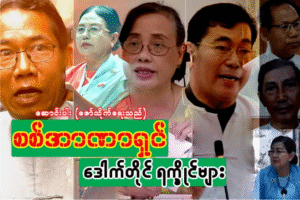Picture Credit: Wikipedia
Article 1 – Wa and Self-Determination
Intro:
This is the first part of a series exploring China’s influence over Myanmar’s ethnic armed organizations (EAOs). Here we look at the Wa, a force often dismissed as a “Chinese colony,” but whose identity and struggle for self-determination deserve to be understood on their own terms.
Opinion: The Wa Cannot Build Their Future on China’s Colonial Chains
Translations and edited from the post of မင်းသစ် in Myanmar.
For too long, the Wa have been reduced to simplistic labels—dismissed as a “Chinese colony” or written off as “Burmese rebels.” These caricatures miss the painful truth: the Wa are a proud people trapped between two predatory powers, fighting to survive in a world where both China and the Myanmar military exploit them for their own gain.
History is instructive. Beijing’s backing of the Communist Party of Burma (CPB) was never an act of solidarity. It was a leash to control General Ne Win. When Ne Win was tamed, CPB no longer served China’s interests, and the CPB was discarded without a second thought. Today, China’s treatment of the Wa is no different: they are a tool to be used, a pawn in Beijing’s great game—not a partner in dignity.
CPB leader Thakin Ba Thein Tin once urged the Wa to stand on their own feet. Instead, survival instinct pushed them into uneasy alliances, even with their enemies. The pattern has repeated for decades: when crises come, the Wa leadership chooses self-preservation over solidarity.
In 2021, the Federal Political Negotiation and Consultative Committee (FPNCC), led by the United Wa State Army (UWSA), pledged to work for a federal democracy. They declared that Myanmar’s struggle was not only a “Burman-Burman problem” but also an ethnic one. Yet, while Burmese PDFs gave their lives, the Wa and their allies kept their distance—careful not to risk Beijing’s displeasure.
By 2025, the mask slipped. China tightened its colonial grip, showing that the “autonomy” it offers is nothing but a cruel illusion. Under Beijing’s shadow, there is no genuine self-rule, no right to chart one’s own destiny. Just as the CPB discovered decades ago, China’s embrace suffocates rather than empowers.
The Wa’s dependence on China’s economy is like standing on one leg over a pit. The trade deals that funnel natural resources across the border are nothing more than daylight robbery—China buying at a thief’s price while the Wa lose their birthright. Worse, illicit industries and criminal economies stain their name, leaving future generations trapped in dependency and dishonor.
This is not self-determination. It is colonial exploitation dressed in new clothes.
If the Wa are to break free, they must reject Beijing’s suffocating embrace and refuse to be used as a buffer zone or bargaining chip. They must also stop making backroom deals with the Myanmar military, which only strengthen Naypyidaw’s hand while eroding their own legitimacy.
The way forward is clear: build a modern economy rooted in federalism and legality. Trade not only with one neighbor but with the world. Invest in human capital, education, and the dignity of lawful governance. Only then can the Wa escape the curse of being forever someone else’s proxy.
Survival is not sovereignty. The Wa deserve more than being pawns in China’s colonial chessboard. The time has come to awaken, to see clearly that Beijing’s promises are chains in disguise—and to choose a future of true independence, dignity, and federal democracy.
Closing note:
The Wa story reminds us that labeling groups through external lenses hides their real aspirations. China’s shadow looms large, but the Wa’s determination to define their own future is equally strong.






